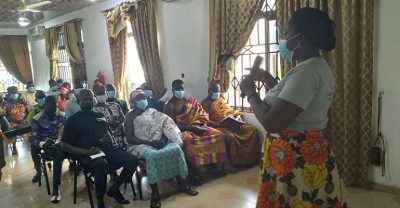Ghana has engaged stakeholders including farmers and forestry officials in the traditional zone on forest management through climate smart agriculture
Ghana has engaged stakeholders including farmers and forestry officials in the traditional zone on forest management through climate smart agriculture practices as both were interdependent.
Tropenbos-Ghana is among the leading implementers of the LEAN project which is focused on improving landscape for agricultural and forestry activities in the traditional areas as they are noted to be the food basket for the country, indicating that the area has farming potentials such as subsistential cropping among other things.
Mrs Mercy Ansah -Owusu Director at Tropenbos-Ghana in an interaction with the stakeholders on Thursday at a stakeholders engagement meeting in the Nkoransa South Municipality of the Bono East region noted that the project is looking at landscape fertility initiatives across the country.
She added that her outfit has been working with three ecological zones including the Traditional, Forest and Savanna indicating that it has taken steps to engage the forest and agriculture sector which are their main stakeholders.
Mrs Ansah-Owusu hinted that the project has engaged over 30 farming communities in the Traditional areas with intensive climate smart agriculture practices. She added that some farmers with special farming activities had also been selected to be trained on the use of organic manure.
She mentioned that the project has been structured in a way that would drive home benefits to the individual farmer, community, district and region as a whole, however farmers who are the main beneficiaries should endeavour to actively participate in activities that would sustain the project.
Mrs Ansah-Owusu pointed out that it was obvious that the climatical conditions were not predictable and it would be prudent for farmers to practice climate smart agriculture practices as it would enable farmers to monitor the rainfall patterns among others.
She explained that the area has lost most of its original forest and agriculture conditions which call for farmers to limit the use of agro-chemicals and use organic manure.
Mrs Ansah-Owusu further explained that agro-chemicals were hazardous to both livestock and human health since it affects the food chain.
She encouraged farmers to adopt climate smart agriculture practices as it was aimed at integrating trees in the farming system so that it would restore the biodiversity, adding that these initiatives were geared at adding up to government livelihood empowerment interventions to grow the economy.
Mrs Doreen Asuman-Yeboah Project Manager noted that the project is targeted at empowering about 12,000 smallholder farmers and also forged at going on the ground to get the people involved by organizing stakeholders engagements to take their suggestions and ideas for onwards implementation of project initiatives.
Touching on the progress of the project she indicated that the project was promising as it has received collaboration from the stakeholders, stating that the project was blended with agriculture and forest activities and this would coach farmers to improve the state of farming in the three zones.
Mrs Asuman-Yeboah mentioned that it would also improve farmers knowledge of forest and farming management.
She urged farmers to safeguard the environment through positive farming practices such as sustainable farming and land production.
Madam Margaret Ampomah, a yam, groundnuts and maize farmer at the Nkoransa South Municipality and Paul Gyamfi cashew farmer at Ofuman near Techiman both participants at the meeting lauded the initiatives on the project.
They said the programme was an eye-opener to them as they now understand that trees on the farm were very important.

COMMENTS